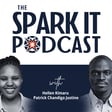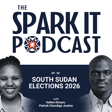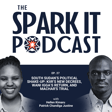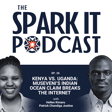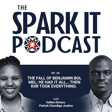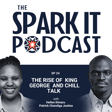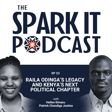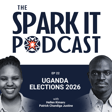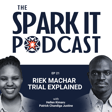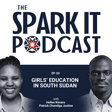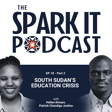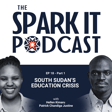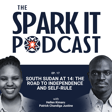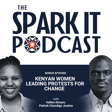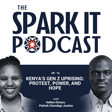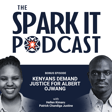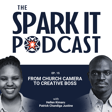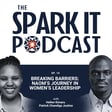Become a Creator today!Start creating today - Share your story with the world!
Start for free
00:00:00
00:00:01

Quitting Business to Build an NGO Empowering Refugees
In this episode, we sit down with Patrick Chandiga Justine, founder and Board Chair of Community Empowerment for Creative Innovation (CECI Uganda), to explore his journey from becoming a refugee, quitting a family-owned business to founding a refugee-led regional NGO serving over 178,000 youth, women, and children. We dive into how his experience of war in South Sudan and hate-motivated violence in refugee settlements in Uganda turned him into a humanitarian, fostering social cohesion and access to education in refugee communities. Tune in to learn how becoming comfortable with being uncomfortable helped Patrick grow and how it could help you take a bold step toward your dreams.
Transcript
Introduction to the Spark It Podcast
00:00:01
Speaker
ah Welcome to the Spark It Podcast with me, Helen Kimaru, and my co-host, Patrick Chandiga. We are so elated for you to be here, and we hope you've enjoyed some of our previous episodes.
Life-Changing Decisions: Patrick's Journey
00:00:15
Speaker
And ah on today's episode, like the last one we did we are going to be discussing life-changing decision that one makes that, you know, either realigns their life or leads to other life-changing experiences for them and how that looks like for Patrick.
00:00:38
Speaker
Patrick, thank you for joining us today. Maybe you can say something. You're welcome. You're welcome. I'm very happy to be here. ah Yes, that that's very, very
Tech Passion: Electronics and Gadgets
00:00:49
Speaker
good. and Maybe before we get started and maybe like take a deep dive into our topic today, because today,
00:00:55
Speaker
We are focusing specifically on your experience and what this decision, what the decision was, what it looked like for you and the impact this decision had on your life and the people around you.
00:01:08
Speaker
Maybe you could tell us maybe some fun fact about you, something that people don't know. Yeah. Okay. Maybe something that people might not know very much about me is that I am a person who really loves gadgets like electronics who I am deep into electronics I love those stuff whether it be phones laptops or recording equipment or stuff like that I love those like they the things is I think I buy most whether it be speakers so much into electronics
00:01:54
Speaker
Yeah. Okay. Yeah. so you But I think for... Sorry. I think that for for people who have been around me, like, longer, who they know that this is something that is ah huge part of me.
00:02:15
Speaker
if that's fun I part, but yeah.
00:02:20
Speaker
Interesting. So should we assume that you are one of those guys who usually has like the latest iPhone or at least when it drops, you are like among the people who are like, yeah, I should get this one.
00:02:31
Speaker
mean, I i you don't know whether that doctor would to be a very good characterization of me, particularly.
00:02:47
Speaker
But I know for sure that I love um i love gadgets that are high-end. Ooh, interesting. Okay. you people People know what to get you for your next birthday then.
00:03:04
Speaker
you You should drop an Amazon wishlist. Oh, my God. Yeah, I would do that. And actually, you have reminded me of this. Yeah.
00:03:18
Speaker
My last birthday on the 20th. And I remember you had reached out, think during my birthday.
00:03:29
Speaker
And you were like, what can I get for you for your birthday?
Gift Wishes: High-End Camera and MacBook
00:03:37
Speaker
I know. Oh, yeah. I had to wonder what happened. Mm-hmm.
00:03:46
Speaker
I remember telling you that I wanted, because I mean, honestly, you you were like, just tell me what I can get you for bite. I was like, this is the opportunity I have been waiting my whole life.
00:03:59
Speaker
so I wanted to ask you that question. And you came along. yeah
00:04:09
Speaker
Yeah, your list definitely ah it needs good money. Yeah, I think we are going to put it somewhere for, you know, if anyone feels like they can buy you a gadget, especially recording equipment and stuff like that, that would be amazing.
00:04:26
Speaker
For sure, 100%. You remember what I asked from you when you asked me? yeah I think the one thing that has been on top of your list has been like this very, like a really good camera.
00:04:41
Speaker
I don't remember which exact type it was. Yes. But you want a camera. Yes. Yes. Yes. and And what I asked from you that day was that I needed the latest MacBook.
00:04:57
Speaker
It had just come out like... Oh, yes. I'm weird. no
00:05:04
Speaker
Yeah, now i remember. yeah Guys, please. He needs a muck look. The latest one, for that matter. Please. oh remove I remember it had just come out like... I remember it had just come out like a week and you called her. I'm like, yes.
00:05:27
Speaker
It's finally happening. Yes. oh my God. I'm sorry. I disappointed in as much as I did ask, but yeah. You know, hope for better this time. For sure.
00:05:44
Speaker
Interesting. mean, I'm still waiting for it. It's not like you said you were not going to provide it
00:05:53
Speaker
Are you still hopeful that I'll get you that? Well, you say it, it's not me. Oh, oh, oh, oh, oh.
00:06:04
Speaker
I'm not so sure if somebody's putting words in my mouth, but anyway, yeah, that that will happen. It will happen this year for sure. Okay, fingers crossed.
00:06:16
Speaker
Yeah, so ah that's interesting. That's an interesting fact, yeah. So for those people who didn't know, Patrick is into high-end gadgets, you know, electronics, the good stuff, the good life.
00:06:31
Speaker
Yeah, that's amazing. Yeah. if you put it that way does it doesn't sound good. No, it's good. It's good. Yeah. Anyway, so and ah in our last episode, we did sort of like a deep dive into my experience.
00:06:48
Speaker
with a life-changing decision that happened, not because I necessarily took it from the very beginning, but for me, it was more of one decision or one action that led to a spiral of more decisions being made and you know and whatever happened and eventually how that kind of shaped what my life looked like. ah So today I would like to ask you,
00:07:17
Speaker
the same question so that we can sort of get like a deep dive into your own personal story and your journey right so what what is this a life-changing decision that you made at some point that has sort of maybe um that changed the trajectory of your life either positively or negatively could you probably just share with our listeners and viewers what that has been or what it has looked like
00:07:47
Speaker
Yeah, for sure. um
00:07:51
Speaker
I actually think that I have a lot that I could talk about, to be honest. like At least decisions that in my own mind would fit the classification of a major life-changing decision.
From Family Business to NGO: A Bold Move
00:08:10
Speaker
But who I think for me, the most significant from amongst all of them would be quitting our family business and then starting an NGO from that.
00:08:28
Speaker
I think for me, that would be like the most significant decision that I made. Because I think I've been like, so we we have this family business, which is a photo studio.
00:08:45
Speaker
Mm-hmm. a studio that does both photography and videography and stuff like that. And I've been engaged in this for a very long time.
00:08:58
Speaker
Okay. Yeah, I think I started engaging there in 2010. Oh, wow. And so, yeah, it's like I've been there working on photos and stuff like that.
00:09:15
Speaker
And it's not like even I was at first allowed to work there. who I think um I had this uncle of mine who was really good and we had this very good relationship with.
00:09:31
Speaker
And so he would teach me Photoshop at night. Yeah.
00:09:42
Speaker
Because I was going to school during that time. So I could not like technically be there like every time during the day to learn this is stuff and so forth.
00:09:54
Speaker
And because I was really curious, I really wanted to learn how to use the software to make all these amazing photos and graphics and things like that.
00:10:09
Speaker
And so... Yeah, i ah requested him to teach me. And he was like, yeah, sure, I can do that. But he would have to come here and sleep here.
00:10:20
Speaker
And then would teach here at night. Yeah. yeah So, yeah. So, during the day, school, during the night, learning. I gave a photo show.
00:10:32
Speaker
Oh, wow. Was this when you were high school? Yes. Oh, wow. Interesting. That's like a lot of dedication for a high school student. At what time are you doing your homework?
00:10:47
Speaker
It's like, a it's really, yeah, i mean, because I used to be at school, anyway, depending, but mostly it used to be like from seven, say in the morning, to four.
00:11:01
Speaker
Yeah, and then it's usually like from Monday to your Friday. So most times we don't have schools like on weekends, so. Mm-hmm. So I made sure that I was doing that.
00:11:13
Speaker
So imagine balancing that, like, with the school notes that you have to read and things like that. Because, again, you need to pass. Mm-hmm. Yeah. So, yeah, I... Mm-hmm.
00:11:28
Speaker
This relative of mine was really gracious. Mm-hmm. And he told me, i always sat there and we watched everything he was doing. And eventually, I learned how to actually use the software.
00:11:45
Speaker
And, yeah. and And so I would do be there only, like, trying out stuff or working working on some pictures sometimes.
00:11:57
Speaker
But only when the others are not there. When it was only him and stuff like that. So sometimes, guys like, We could be operating in the studio and it would be only the two of us and he would be like, yeah, work on these photos.
00:12:12
Speaker
And so I would work on them and stuff like that.
00:12:17
Speaker
And then this one day, because I was just doing that without the knowledge of the owner of the studio and one day was found on it and i was like, wo oh, was it wasn't good.
00:12:30
Speaker
Oh, wow. Oh, so the studio didn't belong to your uncle? No, he did. Oh. My uncle owned the studio. ah Okay.
00:12:42
Speaker
But the one who was training me was not the one who owned the studio. Oh, I see, I see. He was the one managing it. Yeah, yeah.
00:12:53
Speaker
So he was the one managing it. Ah. So what does your uncle tell you at this point? Oh, no, he told me to never be there again.
00:13:04
Speaker
Really? Like, yeah. Oh, wow. Yeah. Yeah, to not be there again. and And of course, I didn't listen.
00:13:18
Speaker
You were a rebel.
00:13:23
Speaker
You could say that, yeah. I guess, like, I had this really, i had this burning fire to really, um, learn this software. I really wanted to know how to use it.
00:13:35
Speaker
I didn't know like where i was going to apply this knowledge, to be honest. I mean, I had no cook computer. It's not like I had it. yeah So yeah, but no, I still kept learning and so forth and I became good in the process.
00:13:55
Speaker
I became so good that one of the brothers of also my uncle discovered One day when I was working on some pictures and he found it was so good.
00:14:07
Speaker
And he was like, yo, actually you should come like every evening and join us and working here and so forth. And I was good. And then I did that for like, I don't know, some weeks.
00:14:22
Speaker
And the owner of the studio again found me there one time and he was not a happy one. He told you not to be here. Yeah.
00:14:33
Speaker
and Yeah, but the other two uncles of mine tried to convince me said, like, he's actually really good, you know? And, but it it was okay. You know, he didn't really see me or see my work to be able, you know, he was just like, you know, you're a kid, you shouldn't be here and stuff like that.
00:14:57
Speaker
Yeah. Which is understandable as a as a as a parent and a guardian, so. a Yeah. And so I left, but's still the gift coming again but still still found your way in.
00:15:16
Speaker
You couldn't stay away. Oh, no, I couldn't. they couldn't. Yeah. um Yeah. But and then one day she landed un really, really quality products.
00:15:30
Speaker
Mm-hmm. and that even him, although he had the knowledge, he hadn't produced anything like it. Oh, wow. So he asks, like, who worked on this? and so And they were like, oh, Patrick did, actually.
00:15:46
Speaker
Interesting. And just i wasn't there. Like, we were happy, that conversation. It was now one of my uncles telling me. was like, whoa, these are really good. Yeah. And then he was like, you know what?
00:15:58
Speaker
Let him keep going. Wow. The transition. So I know that was a transition. And then, um yeah, I basically started going there often to like work there.
00:16:14
Speaker
Excuse me. It's fine.
00:16:19
Speaker
Yeah. So I started going there very often to work there because now I i didn't have to hide. had the freedom to now. display my graphic skills and my skills and just put them out there.
00:16:35
Speaker
Yeah. and And I think it really got good. um And eventually I just became part of the team. um At one point also managing the studio.
00:16:47
Speaker
It's something. Yeah. and And I think I did that for like, I don't know, over six years, close to seven years. Yeah. Interesting.
Relocation and New Beginnings in Uganda
00:16:58
Speaker
Wow. Yeah. And then when the war happened in South Sudan, we had to go to Uganda, of course, and we set refuge there.
00:17:11
Speaker
And we moved the stuff there for the studio and then set up the studio that side. But what happened was, I don't know, I reached a certain point in 2017. I was like, I am tired, man.
00:17:26
Speaker
Mm-hmm. ah I was tired and so I basically decided to quit. Oh, wow. And yeah, I just quit.
00:17:39
Speaker
Because don't know, it felt like
00:17:44
Speaker
I got, I think, I think what the first displacement made me realize was that I had been working at this place for quite a long time now but i didn't really see how much it had contributed towards achieving some of the goals i had set for myself who yeah so i felt like you know what i think i'm not achieving what i wanted to achieve and this place is not contributing enough so yeah i had to quit and that was it i think uh
00:18:25
Speaker
and then went on to start a non-governmental organization. Interesting. I think ah before we get to now you starting the non-governmental organization, i would like to say um looking at your story and how you are sneaking in into the studio and all that, it kind of speaks to the role that parents and guardians have in sort of shaping ah who we become.
00:18:53
Speaker
It's sort of like really key ah because the more you encourage like ah young people or kids or, you know, people in your circle, if you're a parent or something like that, yeah if you encourage them to do something and maybe to embrace a skill,
00:19:11
Speaker
they'll become good at it. So I think maybe you are the uncles who are standing up for you and they're like, yeah, he's really good. I think they did ah amazing because eventually you continued being really good. I know I've seen your work.
00:19:25
Speaker
It's true. ah So, yeah, so so I think that the role you play as guardians and the sort of mentorship you get from the people around you, it can definitely shape like either the skills you get or a ah mindset shift or something like that.
00:19:44
Speaker
ah So what are maybe maybe you should tell us what are these goals you had set for yourself that at that point before you started your NGO, you felt like you had not achieved Mm-hmm, mm-hmm.
00:19:58
Speaker
Yeah, so one of the things that after finishing high school, or at least the things that I had as a goals while in high school was to immediately go to university and enroll basically for a law program.
00:20:19
Speaker
Because I had these, yeah. Interesting. Yeah. Yeah. I didn't know that. Yeah.
00:20:31
Speaker
I know. Yeah. So, um, yeah, I basically really worked hard. Like even when I was in school, I really made sure that I checked the requirements for law school, um, of the schools, mostly those in South Sudan.
00:20:51
Speaker
a And by the time I was sitting for my exam, I was very familiar of the requirements for each university, the grades you need and everything like that. And so I went sitting for this exam starting.
00:21:09
Speaker
I need to get the list this much. who So, yeah. And I was ah determined to make sure i got the grades that can allow me to get into that program.
00:21:22
Speaker
one yeah And, yeah. And I did. Interesting. Yeah, I did. And so the next thing was to go to law school and now that didn't happen.
00:21:35
Speaker
who Yeah. ah So it didn't happen because of the war?
00:21:43
Speaker
Well, no, not exactly. i mean, the war partly contributed to it, but and okay I think at this point, they they the resources I had needed to be able to...
00:21:55
Speaker
um go to school, and especially law school, which was very expensive, the resources I needed were lacking. Okay. And so and one of the things had said for myself was, one, that I get a scholarship, two, raise the funds myself.
00:22:18
Speaker
who And I had to try the scholarship part. was It wasn't going anywhere for some reason. And, uh, I was like, okay, you know, um blood walking I try to raise these resources myself. And, uh, yeah, I, I wasn't seeing my work contributing really much towards me raising the resources I needed to go to school.
00:22:47
Speaker
Oh, wow. And then when they, what happened even that became worse. Uh, ah Yeah. Yeah. So if I were to continue maybe doing that, I don't know, it would take me, I don't know. Forever.
00:23:00
Speaker
but Yeah.
00:23:04
Speaker
To be able to raise the resources. So I was like, no.
00:23:12
Speaker
And then I basically quit it. Yeah. Wow. Interesting. ah So at this point, too there all happens.
Inspiration from Violence: Starting an NGO
00:23:20
Speaker
You guys moved the studio to Uganda.
00:23:23
Speaker
You realize you're not achieving your goals. You can't even you can probably use that job to raise the funds you need to go to law school. And so what sort of sparks your interest now to start an ungovernmental organization?
00:23:40
Speaker
Well, so, and and maybe even before that, something that I really have to clarify is that they the studio much as it wasn't giving me the financial resources that I was hoping would be able to give me who to help me maybe enroll in the school and stuff like that.
00:24:09
Speaker
I think it really gave me um the opportunity to work with so many people. who um And so I i learned it teamwork way early.
00:24:24
Speaker
I learned to work under pressure way early. You know, like, we have days that we have clients from morning, literally, like, super early in the morning.
00:24:40
Speaker
Sometimes, like, in 2, 11 we still have clients. And I've had days where and i've had dates where I'm literally seated working on busy stuff from morning till night till morning the next day.
00:24:57
Speaker
Yeah. And I think that it has taught me to be able to work under pressure who and do that in a super disciplined way.
00:25:10
Speaker
So I think that really like, and also the skills to be honest, especially with the use of like comp computer and so forth. I think that, what happened is that it gave me access to a like computers, like printers, like stuff. These are all the things like I'm super knowledgeable about.
00:25:32
Speaker
and And I think that is because of the studio and the exposure that it gave me. and And this love for gadgets and work, I think it was born from that.
00:25:45
Speaker
It started there. There's a beginning. Yeah, but it kind of like rekindled that fire. I think it was just like inside me and the studio just sparked it.
00:25:57
Speaker
Sparked it. Yes. That's interesting. Yeah. So the studio kind of like, I think, gave me a super strong foundation that I could use.
00:26:14
Speaker
whether it being in writing or communication and stuff like that, because we're always dealing with customers. One of the things like you're going to learn how to communicate with people. So I don't think you like gave me that. And so i was able to use this transferable skills that it gave me to be able to apply them somewhere else in a field different ways.
00:26:44
Speaker
and something like that. Yeah. And we're getting the motivation to start, uh, like an NGO. I really wouldn't pin that on like one thing, to be honest.
00:26:58
Speaker
Because how it happened, I, I never saw coming at all. ah Yeah. Because with when I quit the photo studio,
00:27:11
Speaker
I basically focused more on engaging with the church. Yeah, was more like with the church and stuff like that. I love evangelism for people who know me.
00:27:23
Speaker
I love evangelism. That's like my thing. And even now, I still love it. I think that's something that I want people to do more. told you the other you're a fisher of men.
00:27:40
Speaker
Yeah, I see ip i see where yeah it it stems from. Yeah, maybe. I don't know. Yeah. But yeah, I was very much engaged with that.
00:27:54
Speaker
And so there was this one day I got into the settlement and then I got exposed to things that I think are not super good.
00:28:08
Speaker
So
00:28:12
Speaker
I got to see really like violence being inflicted on some people just because they are from a different, um, like ethnic group.
00:28:25
Speaker
who And it was devastating to watch. Yeah. And there was so much hit. I think it's because of, um, you know, some of the ideas revolving the wall in South Sudan when it is started out in 2013.
00:28:42
Speaker
Yeah. And so I think there was really this hatred that emerged because of whatever has happened where basically communities hurt each other and stuff like that. And so some particular communities are seen as like the reason why are displaced and things like that.
00:29:04
Speaker
And so there was this kind of like targeted violence against certain communities. yeah And I go to witness that and it was horrible. It was very horrible. But of course I didn't know what to do about it.
00:29:19
Speaker
yeah Until I came across a program that was basically raising awareness on all this hate. And I got to learn more about it and it kind of like made me realize that what I was saying or what I had seen was deeper than just someone hitting the other.
00:29:47
Speaker
Yeah. It was like deeper than that. And so I thought I would want to contribute towards resolving that, and finding solutions, lasting solutions to it. And ah yeah, at some point,
00:30:06
Speaker
I found ways to basically contribute to that through like having conversations with people in schools and things like that. Got to meetings, they'd be like, oh, you get to do that here.
00:30:18
Speaker
You have to be registered. And understandably so, because, yeah, I think the government too, the Ugandan government too, and this is understandable. I think they're worried about basically random people going to speak to You know, yeah excuse us, what messages are spreading and things like that.
00:30:40
Speaker
Like who they hold accountable. Yeah. Yeah. Something like that. So, yeah. And I think like that was where we saw the need to register because the important work that I was doing with my friends, do the raising awareness and hate and ethnic violence and stuff like that. We couldn't really do it at a much larger scale without the registration bit of it. And so we thought, okay, the best way is to um register as a community-based organization. And that was how the community empowerment for creative innovations, CSE Uganda was born.
00:31:29
Speaker
Oh, wow. Wow, that's ah that's quite a journey. I mean, like, yeah you leave your job, you become an evangelist, so you're continuing with your evangelism work.
00:31:41
Speaker
You talk to people. And it's ah it's hard to know that and all this violence is happening in South Sudan. People are displaced. And it doesn't matter where you are.
00:31:54
Speaker
Somebody has already carried that seed. The seed was planted. right The hate continues regardless of where somebody is. So maybe to just go back to that, ah is this something ah you are experiencing both online and offline?
00:32:10
Speaker
Or how did that look like? Well, ah I think for me, I hadn't experienced personally online. I know so many who did, who he actually experienced like head, really targeted head,
00:32:31
Speaker
hey content are targeted towards them or people just basically reach out to them and say a lot of bad stuff. Um, but whereas I have not experienced that kind of targeted online violence and hate, I think that myself, I have seen, I've seen people propagate such hate against my community and the other communities like online.
00:32:58
Speaker
Yeah. Like, very divisive messaging that is aimed at dividing people a and at inciting violence and stuff like that. Yeah, I've seen a lot of that online.
00:33:19
Speaker
And offline is where I've experienced the actual physical bit of it. And it's horrible. Yeah, and Yeah, and and seeing that was just devastating. You know, we had a case, and this actually happened in a refugee settlement, and i think this was in, if my memory serves me well, and it was in 2018.
00:33:48
Speaker
We had this case where some young people went to watch football, you know, it's like, It's European football.
00:34:00
Speaker
Yeah. And I think they had a sharp disagreement regarding the game. It's not even a game that was being played in the set of hours. I feel like in Europe, man. I know. yeah I know.
00:34:11
Speaker
Yeah. They had a disagreement over it. i And I think to do with the seat and something like that. And it resulted into serious violence.
00:34:24
Speaker
And I think four people or more died in the process. Wow. Yeah. oh That's a big number. I know. Damn.
00:34:36
Speaker
Yeah. So at this point, it's like people are looking for things that can trigger them. It's not it's no longer about the football match. It's about like the deep-rooted either hate or something like that. So it's easy when you're triggered.
00:34:52
Speaker
Absolutely. Absolutely. And again, like something I said earlier on is that ah wow ah created the these tense relations between communities.
00:35:06
Speaker
And it has made some communities see each other as enemies. That's just all, you know, who so huge South Denise community. People now are more like divided yeah on tribal lines and stuff like that.
00:35:24
Speaker
And so there is already and underlying
00:35:30
Speaker
hatred, deep rooted hate against other people that is just waiting to be triggered. And I think like well that much did or whatever the other person did that angered one of those people basically what it it did is it only triggered something that was already there.
00:35:55
Speaker
Yeah, that's true. Yeah. Yeah. Yeah. crazy yeah yeah It's crazy. It's actually crazy to know that ah this whole tribal thing kind of runs like you're from South Sudan, I'm from Kenya. yeah And it's like we are all facing similar issues on different levels, but the tribal ethnic thing,
00:36:19
Speaker
It's still there. And i I believe right now, Kenyans are really trying to work on that because I feel like the political class have sort of made it a thing that they use against people.
00:36:31
Speaker
so that probably they can get into power. So they try to tell you, you know, um things shouldn't be like this, this person is bad. But on a normal day, i live with everyone.
00:36:43
Speaker
It doesn't matter who you probably live in an apartment where there's like all tribes represented and every day you are saying hello to each other. But then one day somebody tells you like, this person is bad and you just believe it. And then you start hitting them forward.
00:36:59
Speaker
Yeah. And I think honestly, um, what happened, I think is so different, uh, from what you just spoke about. Um, but tribes and clashes and things like that in Kenya, I think it was very much like, um,
00:37:18
Speaker
motivated and fueled with the divisive and discriminative politics, politics that ended creating divisions.
00:37:29
Speaker
I think they call it sectarian politics or something like that. Yeah. Interesting. Oh, wow. Okay. So now you're in Uganda, you've done all this evangelism and yeah you become a peace builder and the government is like, no, you want to see your papers. Are you registered or not? You decide ah now it's time. And now you go ahead and register Sesi.
00:37:53
Speaker
At this point, um, what do you want to do with the organization that you register apart from say you know your efforts to bring people together to address hate speech and you know some bit of peace building so what's like really your other goals with cc at this point when you did the registration
00:38:16
Speaker
uh so honestly like they they go on we ended up um um at least the goals that drove the formulation of Cessie Uganda at that point was something that was very personal to myself and also very personal to the friends and team that we had at the earliest point of formulating Cessie.
00:38:47
Speaker
So, for example, one
CEC Uganda: Education for Refugees
00:38:50
Speaker
of our objective really focuses more on promoting access to formal and informal education for refugees.
00:39:00
Speaker
And this is really hugely informed by the realities that so many refugees have gone through and what is actually also happening, like the refugee settlement.
00:39:15
Speaker
like man from a personal experience. So
00:39:25
Speaker
my my grandparents got displaced. I think it was probably in the 80s, like in the first war.
00:39:36
Speaker
yeah Yeah, the Anyanya war. No, I think SMLM war. Yeah, and they got displaced.
00:39:48
Speaker
And so they had to go to Uganda become refugees and things like that. e And I think that was where most, for the most part, at least part of my parents were raised up.
00:40:01
Speaker
And at one point they moved back and that was where my dad i and my mom met.
00:40:13
Speaker
Interesting. Uh-huh. ahha e
00:40:20
Speaker
I guess my mom and my dad were like, I found one is here. And I was like...
00:40:31
Speaker
um My right or die. Yeah. Yeah. So I think they they met each other after returning from Uganda.
00:40:47
Speaker
to Satsang where they also lived for a very short time to be honest. hit And then they were displaced again by another war.
00:40:58
Speaker
ah And I think at this point, i e my my mom and my dad and me were married. They had me in the stomach. a Interesting. Look at you.
00:41:15
Speaker
All right. Uh-huh. This is interesting. Yeah, I think it was like 1994, probably, around then. And, yeah, had to move.
00:41:29
Speaker
They were forced to move. So they had to go back to Uganda as refugees and something like that.
00:41:36
Speaker
Yeah. And, yeah, they did. And that was where some of us were born, with my siblings and other stuff like that. Oh, wow. And they went back. And again, the same thing happened with me.
00:41:50
Speaker
So when you look at this, it's three generations that have consistently been displaced. And in the process, what has happened is they have experienced like huge educational disruptions that have left most of them.
00:42:12
Speaker
without access to the education is so desperately needed. yeah Yeah. And they were deprived of education by the war.
00:42:25
Speaker
And the same thing that happened to them and my parents is the same thing that also happened to us. The war came in, some of us were just, you know, going to school and stuff like that. And that was also disrupted.
00:42:38
Speaker
And in the refugee settlement, It was more or less not different, to be honest, and much as there is access to education. And thanks to all the partners and donors and governments that are supporting those efforts, I think they are really, really important.
00:42:58
Speaker
And it's good dead that people who are helping do that, they are not, we could say, not offering the best education.
00:43:10
Speaker
Like, it is good. but it's not the best quality. who Yeah, because you have cases where... Sorry. Does it sometimes may feel like an afterthought?
00:43:27
Speaker
and No, not exactly. No, I i wouldn't think i wouldnt to think that way. I think that it's not really like an afterthought, but it's that the resources they have...
00:43:42
Speaker
are very limited that cannot really allow them deliver, let's say the standard of of the quality of education that maybe child is studying in Kampala is receiving for a refugee child.
00:43:59
Speaker
Yeah. when When you look at the facilities that maybe a child in Kampala is studying in to the ones that someone in the refugee settlement and studying in is quite different.
00:44:14
Speaker
and And the same thing goes for, let's say the equipment yeah that you need, for example, for especially people who take like sciences for practicals and things like that.
00:44:29
Speaker
It's very limited. The same thing goes for the books. The same thing goes for just the seats. And so you find some people attending classes and others are seated then others are just standing.
00:44:42
Speaker
because there are not enough seats and things like that. So, yeah, the quality is definitely, like, not the best. And so what happens is that because of some of this stuff, so you find some refugee in children dropping out of school and rather opting for either marriage or opting to return to South Sudan.
00:45:15
Speaker
And in most cases, some opting to just, you know, return back to the country and then join the, whatever's going on. We know whether it be or maybe a the oppositions or whatever. Yeah.
00:45:35
Speaker
Yeah. So you see like all of this. And so for us, we wanted to come in. and see ways we can improve access to education for some of these people that are really like dissatisfied with what is happening there.
00:45:53
Speaker
Or some who have finished, for example, maybe with their high school and they want to be able to go to university. They do not have the resources because most often scholarships are not available that can cover everyone. They are always limited.
00:46:10
Speaker
Yeah. And so most the people are always left out. hate Yeah. And the same thing goes for, um, for high school. There are some people that just to be able to get the best they want to be able to maybe they go and study in a better school, maybe someone out of settlement.
00:46:30
Speaker
And so that's where we come in. o Yeah. Providing the scholarships that can allow them to either go. to university or go to high school or go to access and vocational training. Yeah.
00:46:47
Speaker
Yeah.
00:46:51
Speaker
that's ah That's really impressive. So it's like, ah so from what I've heard, it's like what your parents yeah grandparents, your parents went through, sort of like those gaps that were there that were not filled.
00:47:04
Speaker
At this point, you've already, even yourself, you've already experienced the intermittent kind of, today you're in school, tomorrow is so unknown. or maybe you've gone to a school, or maybe the people who went through this war and they have you know, being displaced to Uganda, the their kids don't get the opportunities they need, or if they get the opportunity, it's not as adequate because of the limited resources.
00:47:31
Speaker
So at this point, ah from what I hear, it's like, it sort of informs your decision and your like. I want to fill this gap using CESI. ah So ah that's that's that's really impressive, honestly.
00:47:44
Speaker
So at this point, are you working with students, that like the scholarships you're offering, are you working with students in high school, students who are out of school, or like what's like sort of your target group with this education that you are, you know, the the kind of gap you're filling for ah these students?
00:48:04
Speaker
Who are you targeting specifically? So... So when we started, we mostly focused on our school children.
00:48:18
Speaker
Yeah, that that was mostly the focus and the focus was mostly refugees. But I think over time, our our target demographic has expanded a little bit.
00:48:32
Speaker
um So now we are able to provide scholarships to out of school children, some special case children, like for example, orphans.
00:48:45
Speaker
But we also have to provide now scholarships to both refugees and the Hoshi community members, because there's some Hoshi community members that really can't afford to go to school. And that's because of that, some of them like have been out for so many years.
00:49:03
Speaker
And so we come in and then Um, give them a second chance at education.
00:49:11
Speaker
Yeah. I think so far it has been great. Uh, yeah. And this has been possible because of our partners. So I think our partners really have been incredibly supportive in helping us expand.
00:49:26
Speaker
Yeah. yeah
00:49:30
Speaker
Wow. Yeah, I think the work you're doing at CSI is very impressive. And knowing that at that point, it's like you put your interests and your goals aside and you are like, I'm going to do this for the community.
00:49:48
Speaker
I think that's like sort of very, it's actually not sort of, it's very inspiring. would say I'm very inspired to today. Yeah. and I was looking at the work you've done with Ceci. You also like are,
00:50:03
Speaker
do, apart from education, you do like peace building, you do, you're addressing climate change. Could you probably talk about some of these other programs that you have at CESI?
00:50:17
Speaker
Yeah, for sure. i I would actually say that the work that is most synonymous with CESI Uganda is peace building.
Conflict Prevention: Community Collaboration
00:50:32
Speaker
Mm-hmm. Yeah, again, coming back from what I said earlier about the violence, the refugee settlement that is targeted, some ethnic groups and things like that, that kind of inter-communal violence.
00:50:50
Speaker
So part of our work is basically working to promote peaceful coexistence among students. ah refugees and between the refugees and the Hoshi communities.
00:51:04
Speaker
And our work has so much been focused on conflict prevention, conflict resolution. And we work with the youth, women, and we work with refugees and the Hoshi communities. and We work with the community leaders, the faith leaders, like work with all the stakeholders to make sure that our peace building initiatives, whether it being or whether it being sports events, I really like something that are informed by the interests of all the stakeholders that we deal with.
00:51:53
Speaker
Yeah. who Yeah. And it's been wonderful. Yeah. It's been really wonderful. I think for me,
00:52:02
Speaker
When, when I think about peace building work, probably think the highlight for me and for other, for my team members, they might disagree or something, but I think for me, the highlight was, um, a peace building initiative that we implemented with Oxfam, um, in 2019.
00:52:28
Speaker
in two thousand and nineteen where we organized a football tournament. We called a peace tournament.
00:52:41
Speaker
And this was an individual refugee settlement in a zone called Zone Play. And so in that zone, particularly, there have been so many
00:52:56
Speaker
tournaments of a similar nature that have been organized by... an international non-governmental organization whom I would not mention the name here.
00:53:07
Speaker
read e But they are the ones in charge organizing those kinds of staff which are related to protection and things like that.
00:53:22
Speaker
her And they did me that, I think, for maybe four times or five times, where they've organized tournament. And then the tournament ends up in violence.
00:53:36
Speaker
Oh, yeah. It never ends successfully. Wow. Like they've had those very many cases where it really didn't work.
00:53:49
Speaker
And so to to their credit, they were now super careful about the organization of such events. Now. When we were coming in to organize those events, we did have this background knowledge.
00:54:06
Speaker
Uh huh. Oh Uh huh. So we go, we we start to organize these events and so forth. And then, uh, we get this report from one of these guys like, no, you cannot organize these events.
00:54:27
Speaker
Mm-hmm. You need to do it. You need to be, and so, and they were really trying their best to make sure we don't organize the events. They were more like, they became more like a barrier, an obstacle that was actually determined to make sure that we never overcome it.
00:54:44
Speaker
ah
00:54:47
Speaker
So yeah, we worked ourselves hard to come to a consensus. hu And, uh, yeah, I mean, eventually we did come to a consensus and they agreed us.
00:55:05
Speaker
They agreed that we could go ahead, organize the tournament and then, uh, we went straight to doing that. And so we asked them about what was it that you guys did?
00:55:18
Speaker
What did you change? Like, I think their only experiences have, uh, in going back to the drawing board to see what can we do different.
00:55:31
Speaker
o To make sure that it doesn't end up in shambles, just like the ones they have had for all this time. ah hu Yeah, and yeah, we we went to the drawing board and now came in and i said, okay, instead of us saying we're organizing this tournament, actually it should be the community organizing it.
00:55:53
Speaker
And so but approach we come in and we're just it there like a facilitator rather than an organizer. Yeah. We're just there to see, a now develop the rules for the tournament, develop the penalties for the tournament.
00:56:11
Speaker
If someone does something wrong, how should they now develop? Like everything you to do with organizing was entirely done by the community. Our work is only to help them document.
00:56:24
Speaker
They're writing all their stuff there and so forth and they would just document for them. I'd say like, you need it? Read it? They would be like, yes. How many copies? who They would tell us. That was the job we were doing. And they engaged the community leaders, they engaged all the youth, they engaged all the referies, the umpires, because it was like involving soccer for men and for for for women.
00:56:53
Speaker
And so They brought all these stakeholders in and they really organized a super cool tournament. And it was just, they asked for students, do you need uniforms?
00:57:06
Speaker
They were like, Interesting. okay at that We get the uniforms. Like, you know, mean literally what they were, they weren't driving the agenda.
00:57:19
Speaker
Ah. Yeah, they were at the forefront of agenda setting for the whole thing.
00:57:28
Speaker
And, um, it worked out incredible because, uh, they, they chose who the referees should be. they chose who, uh, where the playgrounds are going to be. They chose how many teams should be there. Where should they come from?
00:57:46
Speaker
Like everyone was involved. And then tournament is started and everything went great. There was single act of violence. oh That was like a really good approach.
00:58:01
Speaker
I think I have experienced a similar thing where sometimes you think like um you know what people need and maybe you go work somewhere and you are thinking, oh, this is a solution to their problem without necessarily even getting feedback from them on how the approach you should use and all that.
00:58:21
Speaker
So you just, yeah testing as a solution may be and you and you're like, yeah, I think this is a problem. This is a solution. And then some of these projects just fail.
00:58:31
Speaker
because you didn't involve the community. But I guess like for you guys, you found a way to involve them. And at this point, it's like, it's their thing. There's that sort of ownership on their end. So it kind of makes things easier for you.
00:58:48
Speaker
Absolutely. Absolutely. And honestly, for me, I think it's one of those things that I am super proud about. Yeah. who yeah That was a big win.
00:59:02
Speaker
It was. It was. Yeah. yeah I loved it. yeah was scar It was good. Interesting.
00:59:15
Speaker
so Let me ask. ah At this point, you said in 2017, you were young and with such an ambitious dream. you ever feel like sort of and with such an ambitious dream ah did you have a little like sort of Did you ever have like an imposter syndrome? You know, sometimes as young people, we have these big dreams and then there's days you wake up, you're like, am I sure? it gonna work?
00:59:40
Speaker
So maybe you get like that imposter syndrome. and you start doubting the whole process. Did you ever experience these? And if so, or if not, like what was sort of like your support system, either within the organization or outside the organization that sort of made the very foundation of CSI become like something so solid lead that it exists up to now and the impact ah the organization has had has been explosive. Mm-hmm, mm-hmm.
01:00:11
Speaker
Yeah, so when you... um so One thing one thing i will always credit Ceci for, I think, is
01:00:26
Speaker
is that Ceci saved me. Wow. If that makes sense. Yeah, because I think that and it helped me to...
01:00:43
Speaker
into a journey of self-discovery that have never embarked on. Like literally, and I got to truly realize what I was most passionate about.
01:01:00
Speaker
Like the thing that I knew for sure that, oh yes, this is the kind of thing I want you to do. And it's the thing I would be super happy to do for the rest of my life.
01:01:11
Speaker
and and and And this is really like the humanitarian work, like being able to provide the much needed support when it is needed and being able to be there with the community and developing all these solutions and then being able to see the results um and being able to see people really happy, you know, because like very proud we worked on this thing and it worked out that this thing that is just so fulfilling.
01:01:44
Speaker
who Yeah. And I think like it just helped me realize that, oh no, it's not actually law school that I love most.
01:01:58
Speaker
I probably just loved it because
01:02:05
Speaker
I never loved it just because maybe my brother, very close to my mind, and he rested his, was a lawyer and always encouraged to pursue that. And I felt like, oh no, I think that was just like me pursuing his dream, that he asked me.
01:02:24
Speaker
I think this is truly what I want. um So I think that really, um,
01:02:34
Speaker
a it it it served me a lot uh in that sense as in i got to actually discover that bit of myself um yeah through my work and so regarding like um imposter syndrome and maybe support system like that I think that I don't know for other people, because I know a lot of my friends who have started really organizations and organizations that are really flourishing.
01:03:08
Speaker
the
01:03:10
Speaker
But I think for me, what I struggled with most had to do with kind of skills that I needed to learn, because this is an entirely...
01:03:23
Speaker
new field for me. I didn't, I didn't have the, the resources and the knowledge and the technical know-how for the field. And so while other people maybe like got into the field from a certain point to where they had relatively maybe good knowledge about the field, that was not my story.
01:03:50
Speaker
Yeah. Mine was entirely different. I didn't have that. And so I had to get all of this stuff afresh, learn them afresh. So it was a lot of like learning and so forth that I had to do.
01:04:06
Speaker
And I am incredibly grateful to my friends. You like people likean yeah and but like like Rob, you're the brother of Jaksana, and so many guys like at CDC, but even Wysa.
01:04:22
Speaker
I don't you know this organization, um, like my friends there as well, I think they have been incredibly supportive in this journey, you know, terms of giving advice, um, resources and things like that.
01:04:37
Speaker
And even like, you know, including introducing us to networks and things like that. I think like those guys
01:04:46
Speaker
have their support helped me stay on course. Oh, wow. Yeah. That's amazing. Yeah, absolutely.
01:04:58
Speaker
and And it's really good to have that small, close knit community and they were fun. It was nice. The working with them, collaborating with them and so and other things. They're amazing guys. I love those guys.
01:05:13
Speaker
I love them so much. Yeah. yeah
01:05:18
Speaker
Your community sounds like the birds of the same feather flock together because I know some of them. So it's like all of you guys are involved in community work, you know, it's truly amazing.
01:05:33
Speaker
No, those guys are fantastic. Those guys are super amazing. They're doing really some stuff that, you know, when I look at it, be like, damn, who never could have done that.
01:05:44
Speaker
Mm-hmm. And that's impressive. yes Yeah. yeah And I think for me, like, I draw inspiration to keep moving on from these communities that have been there to support, provide advice and things like that.
01:06:05
Speaker
and And also from the community that we work with and the staff that I work with. and so I told you about Our driver, who's been like an incredible, past I think in really like keeping us on course and things like that. mean, someone else would never think that a driver would be such a valuable member of the team.
01:06:35
Speaker
For our case, oh my God, our driver was fantastic. He didn't just know how to drive. a lot of strategic and
01:06:55
Speaker
Yeah. So, yeah, I had all this, you know, huge community that I could lean on for support and stuff like that. And the thing for me, that helped keep me on course.
Challenges and Perseverance in NGO Work
01:07:10
Speaker
<unk> But I think if there's really something that kind of challenged, if whether this is something I would want to continue with, actually had to do with the team.
01:07:26
Speaker
So when I started SES Uganda, you know it was just an idea. a was an idea I had, you know, I shared with my friend, Ricky.
01:07:38
Speaker
I hope Ricky gets to hear this actually.
01:07:43
Speaker
and I shared this with Ricky, he was in South Sudan at the time. And, you know, was like, Hey, you know, I have this idea. I want to do ABCD and things like that. And he was like, you know what?
01:08:00
Speaker
Go for it. Yeah. If there's something of interest to go for it. And so I did, I needed advice from some other guy.
01:08:12
Speaker
people who have actually been in the field. And it was this one guy that I really admired. He's been doing this for a long time. He's like a household man. And I reached out to this guy and, you know, he was like, it's a good idea.
01:08:29
Speaker
need a team. And stuff like that.
01:08:35
Speaker
It was not like the very talkative time, but... I think it gave some valuable insight. And so I was like, okay, I need team because I was only myself.
01:08:46
Speaker
was like, okay, I need a team. So I had to assemble a team. And that was where everything else went and stuff like that. But where it became an issue was when some of these team members started falling off.
01:09:07
Speaker
One by one by... rock oh wow Yeah. Until there was only two of us. Oh, wow.
01:09:22
Speaker
The team was not seen anymore. ah Okay. Interesting. Yeah.
01:09:34
Speaker
Yeah. And I think for me that if there's If there's something that I would say really challenged my decision challenged at least like our why on whether actually this is very something want do, I think was that.
01:09:48
Speaker
Because these people getting full in order and so forth. And yeah, it was only the two of us. And I'm glad that we kept it. We never gave up, pushed on. Yeah. To now, don't know, supporting like over 178,000 people.
01:10:06
Speaker
who Wow. ready Never thought of it. Oh, wow. That's impressive. Actually, I think my next question was on the impact.
01:10:18
Speaker
Like so far, do you have like how the numbers of like how many people people you've supported? Because i was checking like the last report you guys released yeah and you supported a lot of people in 2023, think 2022, 2023. Yeah.
01:10:33
Speaker
yes yes Yeah, it was like a very impressive, comprehensive report. Thank you. So it's do you have like sort of a number from when you started CERC to now, how many people you've sort of directly impacted?
01:10:51
Speaker
So from when we started CERC in now, i think we Right now, we have impacted over 178,410 people. Wow. That's huge. I never forget that. Yeah. Wow.
01:11:09
Speaker
hundred and ten people wow that's huge and never forget that yeah yeah yeah that's I think if I was in your shoes, i would not forget That's impressive. Like, oh my God.
01:11:26
Speaker
Like from a small idea to want to change something for people, to make a difference, to bring about peace building initiatives, offer education, bridge the gap.
01:11:40
Speaker
And now to a hundred, over 178,000. That's that's only for 2017 to 2023.
01:11:49
Speaker
it is and that's only for two seventeen to twenty twenty three And so we've not taken it. We're not talking about 2024?
01:12:00
Speaker
Yeah. I think if you add 2024, it's like over 200K.
01:12:07
Speaker
ah That's like really good numbers, honestly. I'm super proud of you, of your team, and how far you guys have seen, like, sort of um this vision.
01:12:18
Speaker
Do you ever maybe, with especially with the scholarships that you offer for education or the gaps you're trying to bridge whether informal or formal education do you ever sit and feel like it's like your dreams being realized in the um ah you know we ah you have participants like people you sponsor and all that do you ever ever feel like those are your dreams being fulfilled through them like it's like yeah you've planted a seed and you see it flourish and like how does that make you feel
01:12:53
Speaker
i I think for me, so first of all, although I, unlike my parents and grandparents that were completely deprived of education, whereas I got,
01:13:12
Speaker
i I faced so many educational disruptions just like them because of the war. and Whereas for them, they got completely deprived of education as in totally not that.
01:13:26
Speaker
My case is different. I still found ways to go to school um and go to university. I still do that. oh So for me, I think when I see these young people out of school, youth and children to school and accessing scholarships,
01:13:50
Speaker
and access accessing educational resources that I once had no access to. i think for me, I see the dreams of my grandparents and my parents being fulfilled in them.
01:14:04
Speaker
And that makes me happy. That's so good. that's That's amazing, honestly. Wow. Yeah. he Yeah. Yeah. can Interesting.
01:14:15
Speaker
Yeah. I think like my, they, they, They would, my parents, when my, um, my grandparents would have sacrificed anything to see us go to school.
01:14:28
Speaker
And they are such generous people that would have sacrificed anything to see the children of the neighbor go to school.
01:14:39
Speaker
Yeah. And so for me, being able to see, um, all these so many young people from the refugee community and the Hoshi community going to go into school.
01:14:52
Speaker
o I think it's something that they would have loved and appreciated and would have done probably even way better than um i could do. Yeah.
01:15:06
Speaker
yeah yeah Interesting. Oh, wow. So on on this journey you've been on of creating impact, changing lives and all that, how do you, i what would you say, how has it sort of ah shaped your outlook in life, for example?
01:15:32
Speaker
That is a, that's a good one. No, I, I think that if there's anything that, the experience has helped me look at is that
01:15:48
Speaker
it's okay to take risks. It's okay to be comfortable with being uncomfortable.
01:16:00
Speaker
Because I think for me, that's what it really did. From being in this really comfortable space where you don't have to worry about anything because that was what it felt like, uh, the family business.
01:16:13
Speaker
Yeah. Like, you know, you're doing the thing that you're most familiar with. You're the best at it. ah And so totally okay. know, it can give you the the the illusion that you have everything ah and you get so comfortable that sometimes you, you You do not explore other and horizons.
01:16:40
Speaker
e And so for me, when I got out of there, I think it helped me like to embark on the journey of rediscovering myself.
01:16:54
Speaker
Yeah. Interesting. It did that for me, yeah. I got to discover what I was most passionate about. what I genuinely love to do effortlessly, which is the work I'm doing now, you know, supporting communities and things like that is something think have got to discover that it's the thing I love most.
01:17:18
Speaker
Yeah. and And it helped me step out of my comfort zone. I think for me, if there's something is that it has helped me embrace the uncomfortable zone,
01:17:35
Speaker
Yeah, because I have noticed that it is where growth happens. It's where learning happens.
01:17:48
Speaker
It's where you can rediscover yourself. It's where you can rebuild yourself. So, yeah. And I think like really that shaped my outlook on life in that way.
01:18:01
Speaker
Yeah. But also I think now, look at things a little bit more different, not like, you know, being brought up because like, I don't know how this was for you in Kenya and with your family, but for us, you're being brought up and told almost consistently you either need to be a lawyer, you need to be an adopter, or you need to be...
01:18:29
Speaker
Same, same.
01:18:32
Speaker
Yes, that's very typical African.
01:18:39
Speaker
ah It's like you need to be an engineer and there's nothing else as if you can do. You know, like our parents are just hard to think of it, to think of careers in that yeah sense.
01:18:51
Speaker
Yeah. Yeah. You can't almost to see something else outside of this. three or four, five things. Yeah.
01:19:03
Speaker
Which for them, I like for you to actually be educated. You need to be one of those. No, and sadly, even with schools, even now, I think that was emphasized because I remember when and when I was in high school, that was emphasized a lot at some point. And especially with our school, the it was competitive and we had like high performers, high achievers.
01:19:25
Speaker
It felt like if you didn't become like those things, a doctor or whatever, it's as if your life has come to an end. Yes, it's like you're a loser. Yeah, it is, definitely. We need to demystify that more often, especially for students going through the system right now.
01:19:44
Speaker
Absolutely. And for parents too. I mean, you will be shocked. You will think that right now that we have so much information, most of our, at least most parents, maybe not most, but a significant portion of parents today are educated. They have in some education, um probably not the most percentage, but at least a significant portion of that.
01:20:15
Speaker
But you would be surprised that even um in that portion that is educated, there is still that sentiment where they actually push people i i had to specific, you know, like career paths that they think are, and it's not like it's a bad thing.
01:20:37
Speaker
It's not a bad thing, but I think you should probably allow someone one to just explore yeah what they want and then go for what interests them the most.
01:20:51
Speaker
Yeah. And I was shocked to discover this because I would think like this is an African thing. Mm-hmm. And then I come here and then I go to school with some Canadians who and some of them are asking them like, why are you doing this program?
01:21:09
Speaker
ah her And why are you in district school? And then they'd be like, you know, my parents in 80 or 90 something came to district school.
01:21:20
Speaker
And so for them, it's a family tradition. So we'd have to come to district school. And so I've come to stay here. I was like, oh, that's great. Yeah. I mean, it's not like a bad thing. if If what I want to study that interests me the most is in the school that my parents went to, I think I would gladly go there and study there.
01:21:43
Speaker
I mean, do it wouldn't feel bad. yeah But there some of them that at actually bring programs that they are not interested in.
01:21:57
Speaker
Oh. yeah They are just doing it because the parents wanted them to do it. Oh. You know, I've seen people in Kenya do degrees and then they're like, yeah, here's a degree. Now I'm going to go do whatever I want.
01:22:11
Speaker
Exactly. There's actually a student here. There's a student here I know who did exactly that.
01:22:23
Speaker
Yeah. Wow. The parents wanted him to do engineering and so he came. Mm-hmm. engineering performed so well. ah Really good. And then, now went to do the exact thing he's most interested in.
01:22:38
Speaker
who Yeah. Damn. Interesting. Interesting. Oh, wow. Wow. Yeah. You've heard? good That thing still is there.
01:22:49
Speaker
Uh-huh.
01:22:53
Speaker
You had quite a journey. ah Like, what would you say has sort of been like your biggest challenge with this decision that you made from, ah you know, quitting working at the studio and starting a whole organization that has had so much impact?
01:23:09
Speaker
What has sort of been like your biggest, biggest challenge?
01:23:17
Speaker
ae I would think that My biggest challenge actually does not come from the organization, although there are so many challenges I did experience.
01:23:29
Speaker
I think for me, um my biggest challenge came from taking the decision to quit a family business to now focus on my own things.
01:23:41
Speaker
on I think its really created ah rift, like a serious rift between me and my family. Oh, wow.
01:23:53
Speaker
Yeah. but Particularly my uncle. Oh my God. At this point he's like, you're so good at this. Why are you leaving? Yeah. Yeah. Yeah.
01:24:05
Speaker
yeah And I think like, you know, um, he really didn't want me to live. Yeah. And honestly, if he was paying me well, I probably wouldn't have left.
01:24:16
Speaker
Should we thank God he didn't pay you well?
01:24:22
Speaker
ah Because at least you get to see the rest of your journey unfold. ah Yeah, but you know, yeah, it kind of created a real serious rift.
01:24:37
Speaker
Mm-hmm. between ourselves that I really had to work extra harder to mend that relationship.
01:24:48
Speaker
Yeah. Yeah. Because him leading the family business was like, yeah I mean, no one had ever done that before. So, you know, me getting to do that was very strange. It was, I was an outlier.
01:25:02
Speaker
Yeah. i see Yeah. Yeah. yeah Interesting. But, yeah, I think eventually, you know, he got to terms with it.
01:25:15
Speaker
He got to terms that I was doing other things I loved. He didn't understand what that I was doing, but he knew I was doing something.
01:25:26
Speaker
Yeah, and to his credit, although we had that with and stuff like that, I think at certain end point, He got to understand that, you know what?
01:25:39
Speaker
He big enough. He can take care of himself. Yeah. If he's supposed to a BCT, it's just good to be. Yeah. I think at some point he got to understand that.
01:25:51
Speaker
And, um, once he did to his credit, this is really something that I actually won't forget about my uncle is, a he gave us his space, the studio space.
01:26:07
Speaker
Oh, wow. As our first office space for Sessi Uganda. Oh, wow. Yeah. Oh, wow. So when we had a visit by our first donors, the space that we were using as our office space was the studio of my angle. Oh, wow.
01:26:31
Speaker
Yeah, and he was like, you know what, you guys are going ask, yeah, for sure. Say, this is your have studio, and then you organize the space for me and say, this is your working space.
01:26:41
Speaker
I'm sure you did spark something in in him when he saw you like succeed and all that. At that point, he's like, yeah, if there's any help I can offer him, you know.
01:26:53
Speaker
That must have been impressive, and maybe on his part, he must have been very proud. I think so. Yeah, I think so. Yeah. Um, yeah, he, that support meant everything.
01:27:08
Speaker
who Yeah. Um, it helped show very vibrant, organized young organization led and founded by refugees themselves.
01:27:24
Speaker
huh And, um, We had an incredible discussion and, you know, we ended up getting the project. Eesh, that's good. Yeah.
01:27:36
Speaker
Interesting, Wow. o Yeah. and And, you know, we put our issues behind us and eventually came back and we were staying together with my uncle. So we would go like, eat food together, have fun together. It was crazy times.
01:27:52
Speaker
Wow.
01:27:54
Speaker
Wow. ah Wow, I would say I'm really inspired. You've had like sort of quite, I can't believe like one decision to just quit a job led you here to see the impact you've had, the lives that you guys have transformed, the growth with the organization, where you are headed.
01:28:17
Speaker
know, last year, I think towards the end of the year, I saw you post, like you got like sort of a lot of grants to do your projects. yeah For me, I would look at it and I was um amazed at how much, you know, such like a small decision can lead to such big impact.
01:28:36
Speaker
ah maybe what would you tell our viewers or listeners, wherever they are, like what is that one thing you would want them to take away from this conversation, apart from the fact that your journey has been so inspiring and I hope that they're inspired?
01:28:54
Speaker
Honestly, to for me, if if there's something that I think I would want anyone else to probably learn is that you need to become comfortable or with being uncomfortable.
01:29:12
Speaker
Like, for me, it it really worked. you look You know, like, there are so many things that we we want to do. and And sometimes they're not the kind of things that really, like, are easy to do.
01:29:27
Speaker
You know, they require you to do so much, put in so much work and something like that. Mm-hmm. Those and stuff are actually worth it. Mm-hmm.
01:29:38
Speaker
If anything, actually, you should put more effort into such kind of work or activity that you're doing. Mm-hmm. Because eventually, in the long run, it really does pay off.
01:29:53
Speaker
Mm-hmm. Yeah. You get to learn new skills, even if the process is messy. Mm-hmm. you get to learn from it. yeah I think you get to learn from the process, enjoy it, and eventually it it becomes seamless to do.
01:30:14
Speaker
me Yeah. And so I think for me, like people should really um become comfortable with being uncomfortable because that is where self-discovery happens.
01:30:28
Speaker
It is a fact. That growth happens. It's there when to learn new skills because ahha you gotta do this thing. ah You don't have the skills and because you really want to do it, you're forced to learn.
01:30:42
Speaker
Yeah. Like, um, so there's something probably an example of this is, um, you know, you, you work with a nonprofit organization, uh, and you know, this like fundraising.
01:31:00
Speaker
who is a huge part of what makes organizations exist. Oh, it's the lifeline of the organization because it brings in the actual lifeline, which is the money that you need to pay your staff, implement your programs and so much more.
01:31:22
Speaker
So, but I wasn't engaged in any fundraising. Oh, wow. I didn't have any knowledge of that before. ah huh And what I am getting into requires me to do that.
01:31:38
Speaker
Fundraising, yeah.
01:31:42
Speaker
Especially grant writing. ah Yeah, like you have to learn how to do that.
01:31:52
Speaker
And so at that time, I really did have like a laptop or something. had, uh, is this, um, you know, techno? Mm-hmm.
01:32:04
Speaker
Not techno the but techno the phone. Ah, yes, the phone, yes. Uh-huh. Almost not, it's the musician. Uh-huh. Yeah.
01:32:16
Speaker
Uh, I think they're like Chinese phones. I'm not very sure. Yes, yes. Yeah, I think they're Chinese phones. Yeah. So I had a techno 7. It's like, it's like, The size of this phone actually that I'm using currently.
01:32:30
Speaker
So ah use that phone to learn grant writing from YALI online. Oh, wow. YALI has amazing courses.
01:32:44
Speaker
I know. Yeah. I use that, learned it entirely on my phone. And I was first, not I wrote it also, the same thing on my phone.
01:32:56
Speaker
you know, and stuff like that. No excuse. Uh-huh. Oh no, no excuse. Like, again, which is why I'm saying that you have to be comfortable with being uncomfortable.
01:33:12
Speaker
Because you can't tell me writing a promotion here is covered with audio phone and you're writing a number of videos. Uh-huh, uh-huh. Yeah, let alone learning the skills and so forth. So.
01:33:26
Speaker
I think it's really important that people and you do that. Yeah. and And if there's another thing for sure for me is I think do not be afraid to take that decision.
01:33:38
Speaker
It doesn't matter what the decision is. Yeah. Because
01:33:45
Speaker
you can never be sure, like 100% sure of whether the decision you're taking is actually, actually right.
01:33:58
Speaker
Yeah. Like if it's going to lead to this, like, um,
01:34:05
Speaker
It's going to be life changing. yeah It's going to lead to a future of basically, you know, roses and Mary and stuff like that.
01:34:16
Speaker
Yeah. You can never fully tell. But I think it's and it's okay to take the risk. Yeah. Because when decided to quit, I really didn't know what i was going to do next.
01:34:32
Speaker
Yeah. Yeah. No idea. Not a fine idea. Yeah. But in eventually you you get exposed to things, you get to see other things you never have, I don't know, seen.
01:34:52
Speaker
And so you learn from the process and the things evolve. And so do you. You evolve in response and before you know it,
01:35:05
Speaker
You're doing some stuff that you never could have imagined you doing. Wow. Yeah.
01:35:13
Speaker
Interesting. I think that's like very insightful. um i would say from from my end, I'm hearing take risks, make that decision, be comfortable being uncomfortable.
01:35:30
Speaker
It's, yeah, and it's amazing how, as you said, like making just one decision can change ah the whole trajectory of your life and put a lot of things in motion and reflecting on what your journey has looked like.
01:35:47
Speaker
I think even for me, I would encourage people out here to, you know, to pursue those things they so much desire with a lot of passion like you've done.
01:35:59
Speaker
Because even if you're not so sure about the future, but it can be the decision that makes a whole lot of difference and in a positive way, actually. Because for you, your journey, apart from the fact that it changed your life, it has changed the lives of 178,410 people.
01:36:20
Speaker
absolutely Yes. So yeah it's not, sometimes it's not just
Conclusion: Embracing Risks and Challenges
01:36:25
Speaker
about us. It's, it's, it's about even the people around us. So yeah, make that decision. and Yeah.
01:36:32
Speaker
Thank you. Honestly, thank you for, for sharing ah your journey with us at the Spark It podcast. I hope, um I hope this conversation does, you know, sort of spark something in the lives of the people who are,
01:36:48
Speaker
listening to us and they take those risks and become uncomfortable, ah comfortable being uncomfortable. Yeah. It's been amazing hosting you. Thank you.
01:36:59
Speaker
you have any last words?
01:37:03
Speaker
i For the audience? Yeah, maybe for the audience or, you know, we are just wrapping it up. Yeah. No, I think it should be acting out.
01:37:15
Speaker
You know, if it's a business you're thinking of studying, start it. Don't wait for everything to be perfect to start it. If it's a podcast, start it.
01:37:26
Speaker
You're going to learn along the process. You will make mistakes and so forth. It's okay. Start it. If it's a scholarship you want to apply for, start applying for scholarships. You will get rejected so many times, but you will also be learning every single time.
01:37:45
Speaker
So keep applying. You never know. i know you yeah If it's a job, go for it. Just apply. If there's anything is for me, act now. Act now.
01:37:57
Speaker
Wow. Yeah. Too much wisdom from one person. Yeah.
01:38:04
Speaker
No, this is so good. I'm happy to hear all this honestly. It's true. Thank you, Kimaru, baby. Yeah. ah Thank you, Patrick, for joining us for this episode and for sharing your story.
01:38:20
Speaker
It's been the Spark It podcast. Thank you to our listeners and viewers, followers on our social media platforms. We are actually everywhere at the Spark It podcast. And also maybe leave a review, share our podcast episodes with your loved ones and people in your communities.
01:38:40
Speaker
Yeah. And see you next time. Bye-bye. Bye-bye.
